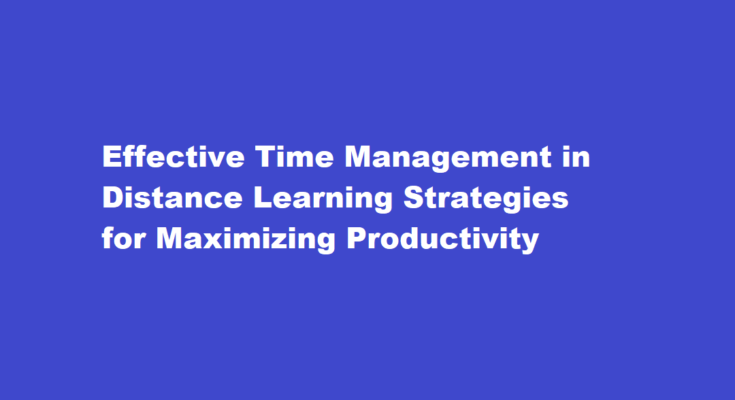Introduction
Time management is a critical skill for success in distance learning. With the flexibility and independence that online education offers, effectively managing your time becomes even more crucial. This article will provide you with practical strategies to help you manage your time efficiently and maximize productivity in your distance learning journey.
Create a Schedule
Start by creating a well-structured schedule that outlines your study hours, deadlines, and personal commitments. Allocate specific time blocks for each subject or task, ensuring you have dedicated periods for studying, assignments, and assessments. Having a schedule helps you stay organized and sets clear expectations for your daily activities.
Prioritize Tasks
Identify the most important tasks and prioritize them accordingly. Focus on assignments and activities that have imminent deadlines or carry significant weight in terms of grades. By tackling high-priority tasks first, you ensure that you meet crucial deadlines and reduce the stress associated with unfinished work.
Break Down Tasks
Break down larger tasks or assignments into smaller, manageable subtasks. This approach makes it easier to estimate the time required for each component and allows you to plan your schedule accordingly. By dividing tasks into smaller parts, you can work on them incrementally, making progress consistently.
Eliminate Distractions
Minimize distractions in your study environment to maintain focus and concentration. Identify potential distractions, such as social media notifications or noisy surroundings, and take steps to eliminate or reduce them. Consider using productivity apps or browser extensions that block distracting websites during your study sessions.
Practice Time Blocking
Time blocking involves allocating specific time slots for different activities or subjects. Set aside uninterrupted blocks of time for focused studying or completing assignments. During these blocks, eliminate distractions and fully immerse yourself in the task at hand. Time blocking helps improve efficiency by preventing multitasking and promoting deep concentration.
Use Productivity Tools
Leverage productivity tools and apps to streamline your workflow and manage your time effectively. Digital calendars, task managers, and reminder apps can help you stay organized, set deadlines, and receive timely notifications. Experiment with different tools to find the ones that work best for your learning style and needs.
Take Regular Breaks
While it may seem counterintuitive, taking regular breaks can actually enhance your productivity. Short breaks allow your brain to rest and recharge, improving your focus and cognitive performance. Incorporate brief breaks into your schedule, ensuring you step away from your study space and engage in activities that relax and rejuvenate you.
Foster Self-Discipline
Maintaining self-discipline is key to effective time management. Hold yourself accountable for following your schedule and meeting deadlines. Avoid procrastination by setting small, achievable goals and rewarding yourself upon their completion. Cultivate a strong sense of commitment and remind yourself of the long-term benefits of effective time management.
Seek Support and Collaboration
Distance learning does not mean you have to navigate your academic journey alone. Reach out to instructors, classmates, or online study groups for support and collaboration. Engaging in discussions and sharing ideas can enhance your understanding of the material and expose you to different perspectives.
Conclusion
Effective time management is essential for success in distance learning. By creating a well-structured schedule, prioritizing tasks, eliminating distractions, and utilizing productivity tools, you can optimize your productivity and achieve your academic goals. Remember to take breaks, foster self-discipline, and seek support when needed. With these strategies in place, you can effectively manage your time and make the most of your distance learning experience.
Frequently Asked Questions
How can I create a schedule that accommodates my personal commitments and coursework in distance learning?
Start by identifying your personal commitments and their time requirements. Then, allocate specific time slots for studying and completing coursework, considering your personal obligations. Be realistic in your scheduling and make adjustments as needed.
What should I do if I frequently struggle with procrastination in distance learning?
Procrastination can be a common challenge in distance learning. Combat it by breaking tasks into smaller, manageable parts, setting deadlines, and holding yourself accountable. Utilize productivity techniques such as the Pomodoro Technique or time blocking to overcome procrastination tendencies.
How can I balance multiple courses and assignments effectively in distance learning?
Prioritize tasks based on deadlines and importance. Break down assignments into smaller tasks and allocate specific time slots for each. Consider using productivity tools or apps to track and manage multiple courses simultaneously.
Is it necessary to follow my schedule strictly in distance learning?
While it’s essential to have a schedule, flexibility is also crucial in distance learning. Be adaptable and open to adjusting your schedule when unexpected circumstances arise. However, try to maintain a consistent routine to foster discipline and consistency.
How can I make the most of my study breaks during distance learning?
Use study breaks to engage in activities that help you relax and recharge, such as taking a short walk, doing stretching exercises, or practicing deep breathing. Avoid activities that may consume excessive time or distract you from returning to your study tasks promptly.
Read Also : How to Succeed in Distance Learning Tips and Strategies for Academic Excellence



